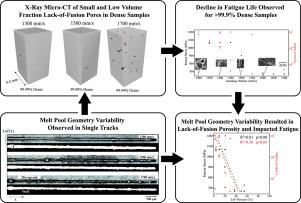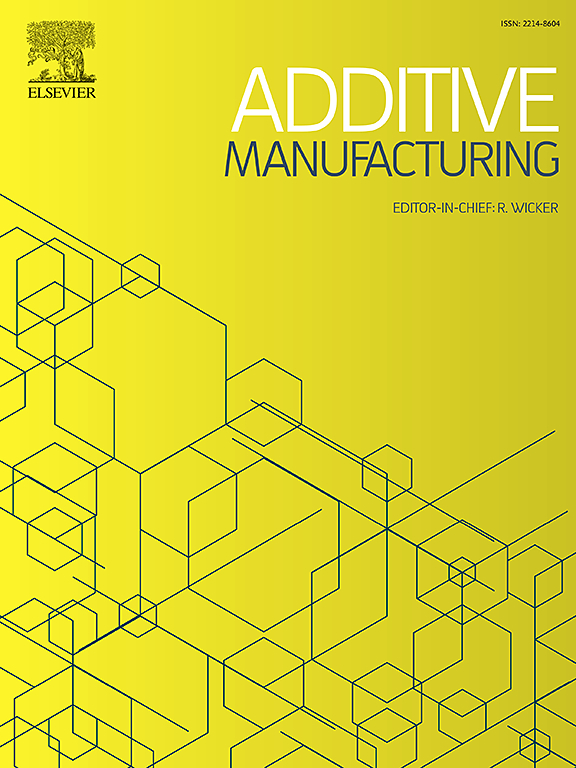熔池几何形状的变化对粉末床熔融-激光束 Ti-6Al-4V 中熔融缺乏孔隙率和疲劳寿命的影响
IF 10.3
1区 工程技术
Q1 ENGINEERING, MANUFACTURING
引用次数: 0
摘要
粉末床熔融激光束 (PBF-LB) 零件在出现工艺缺陷时,疲劳性能会显著下降。在这项工作中,以恒定功率制造的 PBF-LB Ti-6Al-4V 试样在扫描速度不断增加的情况下,其 4 点弯曲疲劳寿命出现了下降,随后对试样进行了应力消除和表面加工。具体地说,在扫描速度低于先前发表的研究成果所预期的速度时,观察到了类似于熔合不足(LoF)的孔隙的存在以及疲劳寿命的下降。据推测,这种意外出现的 LoF 孔隙是由于熔池几何形状的变化造成的,而之前的工作在实施 LoF 标准时并没有考虑到这种变化。此外,在熔池几何形状变化不严重的情况下,这些孔隙的尺寸可能很小,出现的频率也不高。使用传统的二维表征方法表征此类稀疏孔隙具有挑战性。这项研究利用高而窄的试样几何形状和高分辨率 X 射线显微计算机断层扫描 (X-μCT) 捕获 LoF 孔隙率。结果表明,考虑到熔池几何形状的可变性,基于熔池重叠的 LoF 标准进行了修改,从而捕捉到了在 X-μCT 中观察到的意外出现的 LoF 孔隙。此外,LoF 百分比指标与疲劳性能呈强烈的负相关。这项工作的启示为描述各扫描线上熔池几何形状的变化提供了指导,以便系统地评估产生 LoF 孔隙的加工参数,而 LoF 孔隙反过来又会降低疲劳性能。本文章由计算机程序翻译,如有差异,请以英文原文为准。

Impact of melt pool geometry variability on lack-of-fusion porosity and fatigue life in powder bed fusion-laser beam Ti–6Al–4V
Powder bed fusion-laser beam (PBF-LB) parts experience a significant decline in fatigue performance when process-induced defects are present. In this work, a decline in 4-point bend fatigue life was observed in PBF-LB Ti–6Al–4V coupons fabricated at constant power with increasing scanning velocity and which underwent subsequent stress relief and surface machining. Specifically, the presence of pores that resemble lack-of-fusion (LoF) and a decline in fatigue life were observed at scanning velocities lower than that expected from prior published work. It was hypothesized that this unexpected presence of LoF pores resulted from melt pool geometry variability that was not considered in prior work when the LoF criterion was implemented. Further, these pores can be small in size and infrequent in their occurrence when the melt pool geometry variability is not severe. Such sparse pores are challenging to characterize using conventional 2D characterization methods. This work leverages tall and narrow coupon geometry and high-resolution X-ray micro computed tomography (X-CT) to capture LoF porosity. The results show that a modified melt pool overlap-based LoF criterion considering melt pool geometry variability captures the unexpected occurrence of LoF pores observed in X-CT. In addition, the LoF percent metric displays a strongly negative correlation with fatigue performance. The insights from this work provide guidance on characterizing melt pool geometry variability across scan lines to systematically evaluate processing parameters that generate LoF pores, which, in turn, could lower fatigue performance.
求助全文
通过发布文献求助,成功后即可免费获取论文全文。
去求助
来源期刊

Additive manufacturing
Materials Science-General Materials Science
CiteScore
19.80
自引率
12.70%
发文量
648
审稿时长
35 days
期刊介绍:
Additive Manufacturing stands as a peer-reviewed journal dedicated to delivering high-quality research papers and reviews in the field of additive manufacturing, serving both academia and industry leaders. The journal's objective is to recognize the innovative essence of additive manufacturing and its diverse applications, providing a comprehensive overview of current developments and future prospects.
The transformative potential of additive manufacturing technologies in product design and manufacturing is poised to disrupt traditional approaches. In response to this paradigm shift, a distinctive and comprehensive publication outlet was essential. Additive Manufacturing fulfills this need, offering a platform for engineers, materials scientists, and practitioners across academia and various industries to document and share innovations in these evolving technologies.
 求助内容:
求助内容: 应助结果提醒方式:
应助结果提醒方式:


